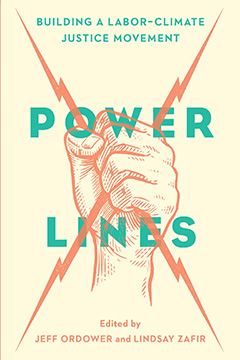“The climate movement needs the labor movement to win a just transition. Power Lines is an essential how-to manual for organizers looking for the most creative, visionary, and practical strategies to bridge our movements.”—Varshini Prakash, executive director, Sunrise Movement |
“Power Lines answers a crucial question: how to make a living on a living planet? With numerous examples to draw from, this book is a necessary corrective to the idea that creating economic prosperity for workers and communities comes at the expense of climate action. In fact, pursuing both goals is not only possible but happening all around us!”—May Boeve, executive director, 350.org and 350 Action Fund |
“Decades of collective experience inform the writing in Power Lines; key organizers connect the dots of struggle in the sometimes fraught intersection of labor organizing and movements for climate justice. We can learn lessons from both success and failure, and this collection clarifies the central question that must animate our organizing: how do we build the kind of power that can help ordinary people reshape the world?”—Alex Han, In These Times |
“Power Lines presents critical case studies on advancing all communities towards a just transition. The book provides key insights directly from the frontlines on how we can organize our communities towards collective power, navigate tensions, and truly advance change.”—Shantell Bingham, organizing director of Climate Justice Alliance |
“A positive look at how using organized labor strategies has proven beneficial in environmental organizing efforts.”—Library Journal |
“An excellent primer.”—Boston Review |
“This is it. We are in the midst of one of the most pivotal struggles of the modern era. To meet the challenge of the moment, our movement—both community and labor—must partner and fight together. The essays in Power Lines provide powerful examples of how organizers from across the country have taken the challenge of weaving together the strands of our movement for the collective power we need to save us, to save the world.”—Lauren Jacobs, executive director, PowerSwitch Action |
|
“What grabbed me about Power Lines was that the analyses offered truly reflect an understanding that climate politics is a struggle over power. This unusually good collection of working class–based environmental justice analyses and summations is thought-provoking and extremely useful in order to advance discussions within social, economic, and environmental justice movements.”—Bill Fletcher Jr., former president of TransAfrica Forum and co-founder of the Black Radical Congress |
“Power Lines is a powerful book that highlights how increasing numbers of unions are engaging in deep and important political education work with their members about the role of their employers in profiting by ravaging the planet. The next step is to make climate issues a central bargaining issue by Bargaining for the Common Good, creating concrete demands that protect workers, their communities, and the planet.”—Stephen Lerner, labor and community organizer and architect of the Justice for Janitors campaign |
“This is a book that could brighten your life and stiffen your spine. These experienced and wise organizers search the world we share for the stories of movement uprisings that could spark something big enough to save us yet. Read the book. It will make you feel better. It may even make you join the fight.”—Frances Fox Piven |
“This book is a balm in troubling times, showing us that new kinds of unions and unlikely political coalitions are not just possible: they’re already here. The organizers here give an honest accounting of their failures as well as successes as they build the green economy, one farm worker cooperative or resilience hub at a time.”—Sarah Jaffe, author of Work Won’t Love You Back and Necessary Trouble |
“Power Lines helps deepen the debate about how to unite and fight for a ‘Green New Deal’—or any better deal than the status quo.”—Jacobin |
“The environmental movement and the labor movement need to not just work together. They need to overlap and pollinate each other, with the tools for organizing and analysis that each possess. This compelling anthology offers a wealth of advice on how to make that task happen—quickly, one hopes, for the sake of a planet that works in every sense of the word.”—Bill McKibben, author of The Flag, the Cross, and the Station Wagon |
“It is widely acknowledged that, if a movement to confront the climate catastrophe is to be successful, it must include working people on the front lines. Often, however, the conversation does not get much further than that. Ordower and Zafir’s Power Lines shows that we do not need to start at square one in building a labor–climate justice movement. Rather, we can draw rich lessons from organizing that has taken place over the past two decades.”—Mark Engler and Paul Engler, authors of This Is an Uprising |
|


